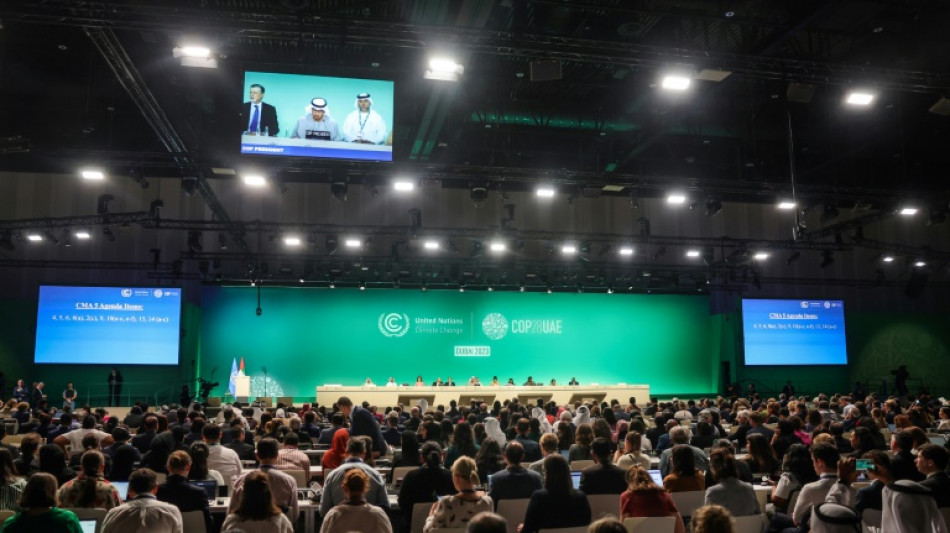
-
 Far right eye breakthrough in Romania presidential vote
Far right eye breakthrough in Romania presidential vote
-
Jaiswal slams majestic 161 but Australia fight back in Perth

-
 Edinburgh's alternative tour guides show 'more real' side of city
Edinburgh's alternative tour guides show 'more real' side of city
-
IPL teams set to splash the cash at 'mega-auction' in Saudi Arabia

-
 Olympics in India a 'dream' facing many hurdles
Olympics in India a 'dream' facing many hurdles
-
Wounded Bangladesh protesters receive robotic helping hand

-
 Majestic Jaiswal 141 not out as India pile pain on Australia
Majestic Jaiswal 141 not out as India pile pain on Australia
-
Giannis, Lillard lead Bucks over Hornets as Spurs beat Warriors

-
 Juan Mata agent slammed as 'cowardly' by angry A-League coach
Juan Mata agent slammed as 'cowardly' by angry A-League coach
-
Marta inspires Orlando Pride to NWSL title

-
 Palestinian pottery sees revival in war-ravaged Gaza
Palestinian pottery sees revival in war-ravaged Gaza
-
Main points of the $300 billion climate deal

-
 Robertson wants policy change for overseas-based All Blacks
Robertson wants policy change for overseas-based All Blacks
-
Israel retreat helps rescuers heal from October 7 attack

-
 Afghan women turn to entrepreneurship under Taliban
Afghan women turn to entrepreneurship under Taliban
-
Mounting economic costs of India's killer smog

-
 At climate talks, painstaking diplomacy and then anger
At climate talks, painstaking diplomacy and then anger
-
Uruguayans head to polls with left hoping for comeback

-
 Trump's mass deportation plan could end up hurting economic growth
Trump's mass deportation plan could end up hurting economic growth
-
Iran director in exile says 'bittersweet' to rep Germany at Oscars

-
 US consumers to bargain hunt in annual 'Black Friday' spree
US consumers to bargain hunt in annual 'Black Friday' spree
-
Cheers, angst as US nuclear plant Three Mile Island to reopen

-
 Scientists seek miracle pill to stop methane cow burps
Scientists seek miracle pill to stop methane cow burps
-
Australia ditches plans to fine tech giants for misinformation

-
 Developing nations slam 'paltry' $300 bn climate deal
Developing nations slam 'paltry' $300 bn climate deal
-
Red Bulls win 'Hudson River derby' to reach conference final

-
 Neuville wins world title after Tanak crashes at Rally Japan
Neuville wins world title after Tanak crashes at Rally Japan
-
Neuville wins world rally title after Tanak crashes in Japan

-
 Colapinto cleared for Las Vegas GP despite heavy crash
Colapinto cleared for Las Vegas GP despite heavy crash
-
'Smiling One' Amorim vows he has ruthless streak Man Utd need

-
 Marseille down Lens to stay in touch with Ligue 1 leaders, Lyon draw
Marseille down Lens to stay in touch with Ligue 1 leaders, Lyon draw
-
New Zealand beat 'proud' Italy in Cane's Test farewell

-
 Barca collapse in Celta draw without Yamal, Simeone hits milestone
Barca collapse in Celta draw without Yamal, Simeone hits milestone
-
Thailand's Jeeno equals Yin for lead at LPGA Tour Championship

-
 New Zealand beat Italy in Cane's Test farewell
New Zealand beat Italy in Cane's Test farewell
-
Marseille down Lens to stay in touch with Ligue 1 leaders, Lyon held to draw

-
 Liga leaders Barca suffer late collapse in Celta draw
Liga leaders Barca suffer late collapse in Celta draw
-
Retegui fires Atalanta top of Serie A ahead of Inter

-
 Greaves hits maiden Test century as West Indies dominate Bangladesh
Greaves hits maiden Test century as West Indies dominate Bangladesh
-
Venezuela opposition calls for mass anti-Maduro protest on Dec. 1

-
 'Fragile' Man City in uncharted territory, admits Guardiola
'Fragile' Man City in uncharted territory, admits Guardiola
-
Erasmus hails Springbok strength in depth after thrashing Wales

-
 Postecoglou calls for consistent Spurs after Man City rout
Postecoglou calls for consistent Spurs after Man City rout
-
'We've never lived this situation' admits Guardiola

-
 Lebanon says more than 55 killed in Israeli strikes
Lebanon says more than 55 killed in Israeli strikes
-
'We've never lived this situation' admits Guardiola as Man City lose five in a row

-
 Under-fire Gatland 'motivated' to continue as Wales coach
Under-fire Gatland 'motivated' to continue as Wales coach
-
South Africa send Wales crashing to 87-year low in Test rout

-
 Spurs condemn Man City to fifth straight defeat as Arsenal win
Spurs condemn Man City to fifth straight defeat as Arsenal win
-
Defeated Leipzig lose more ground on Bayern, Frankfurt go second


Nations to submit boosted climate plans: what's at stake?
Nations have begun setting carbon-cutting targets for the decade ahead, and how ambitious these pledges are could make or break global efforts to avoid dangerous levels of climate change.
Nearly 200 countries are supposed to publish updated climate plans by early February, but so far only three have done so.
On Wednesday, the UK became the latest, announcing during the COP29 climate summit in Azerbaijan that it would raise its target to cut greenhouse gas emissions.
All eyes will be on other big polluters like China, India and the United States, though future US climate action is unclear following Donald Trump's election.
- Why do they matter? -
The world has agreed to try and limit global warming to 1.5 degrees Celsius above pre-industrial levels, but is nowhere near on track.
Above this threshold, scientists say humanity risks disastrous consequences from volatile weather to major ecological "tipping points" at land and sea.
Last month, the United Nations warned that even if all existing plans are implemented in full, temperatures would rise 2.6C by the century's end, a catastrophic outcome.
The UN says the next round of climate plans must show a "quantum leap" in ambition to avert the worst.
The G20 -- which accounts for 77 percent of total greenhouse gas emissions -- is under particular pressure to step up.
- Early movers -
Just before COP29 opened in Azerbaijan, the United Arab Emirates announced a 47 percent reduction in emissions by 2035 compared with 2019 in its updated climate plan.
Observers said the roadmap failed to account for exported emissions -- including those from its sales of crude oil abroad.
Next year's UN climate host, Brazil, has partly unveiled its plan, increasing its emissions reduction target from a 59 percent cut by 2035, from 2005 levels, to a 67 percent reduction.
It is expected to unveil a more complete plan during COP29.
Plans from other major emitters, like the European Union and China, are not expected until next year.
And the current US government could soon outline Washington's new pledge, despite questions over Trump following through once in office.
David Waskow, of the World Resources Institute, said it would help guide American cities, states and businesses wishing to continue climate action under Trump.
"It also sends an important signal internationally, a set of benchmarks for what the US ought to do," he added.
- What do countries need to do? -
By signing the Paris accord, nearly 200 nations agreed to halt rising temperatures "well below 2C" and strive for the safer goal of 1.5C.
But it did not prescribe how to get there.
The deal left it up to countries to voluntarily chart their own plans and targets, known as Nationally Determined Contributions (NDCs).
These include emission reduction targets and measures to achieve them, such as rolling out renewable energy, electrifying transport, and ending deforestation.
There is no set template for countries to follow but richer countries -- historically the largest emitters -- have a responsibility to pledge the deepest emission cuts.
The plans must be reviewed every five years, with each update supposed to be more ambitious than the last.
This time around countries are expected to improve their 2030 targets and outline economy-wide action they will take to 2035.
- What's the aim? -
An agreement at last year's COP28 climate summit "encouraged" countries to come forward with plans aligned with halting warming to 1.5C.
To have a hope of meeting that goal, emissions must be slashed 42 percent by 2030 and 57 percent by 2035, the UN's Environment Programme said last month.
Currently, however, emissions are continuing to rise.
Keeping 1.5C on track would require a collective effort "only ever seen following a global conflict", it added.
Without pulling together "on a scale and pace never seen before... the 1.5C goal will soon be dead," said UNEP executive director Inger Andersen.
The big moment for assessing progress towards the 1.5C goal comes at a crunch COP30 climate summit in Brazil next year.
- What about fossil fuels? -
Scientists and the International Energy Agency have said that developing new fossil fuel projects is incompatible with halting warming to 1.5C.
But many fossil fuel producing countries argue that new oil and gas projects will be needed as the world transitions to net zero emissions.
Countries are under pressure to outline in their updated plans how they intend to reduce their reliance on fossil fuels, something all nations agreed at last year's COP.
O.Bulka--BTB



